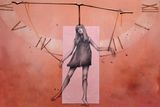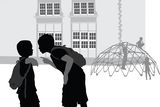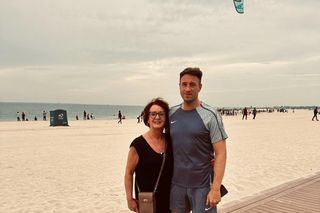'I worry that I've done something awful to my child and blanked it out'- Bryony Gordon on her life long battle with OCD
Billed as a real-life Bridget Jones, Bryony Gordon spent her twenties single and partying, and documented it all for her much-loved column. Then she met a man, had a baby and settled down to live happily ever after. Except she didn't. The OCD she had struggled with since she was a child came back, and she decided enough is enough. In her new book, 'Mad Girl' she speaks out for the first time about her lifelong battle with OCD. Here she tells our reporter about worrying you might hurt your child, and suffering from bulimia, alopecia and domestic abuse.
'Can you check there's nothing in that cup, that I haven't put bleach into it?" says Bryony Gordon, holding up the empty cup she's about to pour her three-year-old daughters milk into for me to check. "It's an OCD thing," she says, muttering that they don't even have bleach in the house.
Two years ago, Bryony's best- selling first book, The Wrong Knickers, documented the columnist's twenties and her endless relationship disasters. The one-night stand who produced a lump of butter as a suggested lubricant (she faked lactose intolerance). Having cocaine snorted off her bare breasts by a man she had just met. The affair with a married man, picking up a date in the waiting room of an STD clinic, a several-times-a-week coke habit, it was no holds barred by anybody's standards. And yet, this was only half the story.
What she didn't mention was that since she was 12, Bryony has suffered from OCD, obsessive compulsive disorder, in which a person suffers from unwanted obsessive thoughts and fears, and compulsive behaviour and rituals. For Gordon, it started with the fear of contracting AIDS, and rendered her mental health so fragile that she has suffered five breakdowns in the past 20 years.
She has brought the iron into work in her handbag, to be sure she hasn't left it on at home, checked with friends when she returns from the pub bathroom to see how long she's been, in case she has been raped and blanked it out. Five months pregnant on holiday in the Bahamas with her now husband Harry, she became convinced that the baby wasn't his, texting friends to check she hadn't had a drunken one night stand she had forgotten.
Bryony Gordon on her wedding day with her husband Harry.
That first episode, when she was 12, lasted just a couple of months, from the outside, she reflects, it could have seemed like a bout of moodiness, typical pre-teen stuff. She didn't tell anyone. "And then I don't think I had it at all until I was 17. "This time her mum, the journalist Jane Gordon, brought her to the GP. "And it's been a sort of low hum ever since. A lot of it, I don't even realise I'm doing. So like, the bloke I sit next to at work notices me just muttering." This is the daily recitations chanted in order to ward off harm to loved ones.
"When I'm putting Edie to bed, I have to say cot life, cot living, because I can't say the other thing. But those to me are such minor points of OCD because they are like a Dido album, a broken record in my head.
"The really disturbing things to me are when I worry that I've done something awful to my child and blanked it out." The OCD rendered her vulnerable and she suffered stress-related alopecia for most of her twenties. For a time it left her looking like Donald Trump, she says, throwing forward her hair to show me the one remaining patch, a small, smooth spot at the nape of her neck.
Gordon, in fact, now 35, is stunningly attractive, with a thick head of hair - pregnancy remedied the alopecia, she says - and glowing, healthy skin. "Did anyone ever tell you you look a bit like Kate Winslet?" the actor Hugh Jackman once asked on sitting beside her on a flight. "Did anyone ever tell you you look a bit like Hugh Jackman?" she quipped back.
She suffered from bulimia for years, confessing that she first moved out from the family home not from a desire for independence, but because she wanted to be free from the concern of someone hearing her vomiting. Years later a tooth fell out, destroyed by stomach acid. Her self-esteem was so low it left her vulnerable to a violent relationship that lasted a number of years.
I speak to her on the publication day of the new book. We're sitting in the kitchen of Gordon's new home. They've just moved in last week, but already it feels like a settled family home. Put the pictures up immediately and then you don't have to do anything else for ages, she observes.
She's been up since four to do morning TV, after which there was an unexpected visit to the doctor and then A&E with Edie to have a cough and rash checked out. This turned out to be okay, and it's on with the day's schedule - childhood friends to touch base with for a brief lunch who are visiting from the US and Australia - 'we're in all her columns', they tell me gleefully, she's rubbish at picking false names.
They clearly adore her, these three men who've know Bryony since she was a teenager. Lunch over, it's Edie back in the buggy, hustle the friends along, point them in the direction of the best nearby pub, and to her house, a beautiful period home in Clapham, for our interview.
Bryony Gordon and baby Edie
Edie is settled on the couch with cartoons and hot chocolate, and Bryony sits me down at her kitchen table. "I went to my therapist yesterday, I knew I had to see her because I was coming into this busy week. It sounds very hashtag first world problems, but I just know I have to look after myself. For so long, the way I tried to look after myself, was self-sabotage. I would self-medicate. And it made it worse. So it was really hard to learn how not to do that."
Her happy beginning, as she terms husband Harry and daughter Edie in her books, didn't mean an end to the unhappiness. "The thing about mental health is that people say 'well, how did you cure it, what did you find worked for you?' I don't know. You still have days where you're crap, and you have days where you're great. Like yesterday, I just had to say to Harry 'you're going to have to take Edie to nursery'. I think Matt Haig is brilliant at describing it. With suicide, it's not that you want to die, it's that you don't want to live. It's also that thing of it's not so much what you're feeling as what you're not feeling. I know that if I'm not conscious of my OCD every day, then I'm more likely to slip into a really big episode."
She named her OCD Jareth the Goblin, after the David Bowie character in the movie Labyrinth. In a way, she says, it's more difficult to deal with in the light of her newfound personal happiness. She worries about the affect it might have on her family, and she now has something of incredible importance for OCD to attach its fears to.
"I don't know if it affects Edie because I don't know if she's aware of it. I hope she isn't. But I know it affects Harry. And it's harder because it attaches to things that are deeply valuable to me. Whereas I didn't have anything of value to me in The Wrong Knickers stage.
"It didn't even occur to me (to write about it)" she says now of leaving it out of the first book. With The Wrong Knickers it was like 'lets make everyone laugh', I was that monkey with a miniature cymbal, perform, perform. And I used to get my validation out of how many laughs I'd get. But I realised it's okay to be serious, and not have to make everyone laugh with jokes about really terrible shags you've had. It's okay to be sad. That's one thing I think is really key. As kids we're taught about happy ever after and our happy endings, and I'm guilty of perpetrating that a bit with The Wrong Knickers. But of course that wasn't my happy ending."
It was having her daughter that prompted her to come out of the mental health closet. "While I was pregnant I thought 'oh my OCD's going to get really bad (once Edie is born)'," she recalls, but actually it didn't. The levels of hygiene required by a newborn didn't phase her, she was used to them from her OCD. It was months later, when Edie was 20 months and Bryony had gone back to work, that it all came tumbling down. "I just sort of crashed. That episode was really bad because it attached this dear thing to me, which was my child."
Fears that she might hurt Edie plagued her. "I'd just had enough. Having a child, it made me think I'm not going to put up with this in silence anymore. So I thought if I write about it in the most clinical terms possible, and explain that it is this condition, people can't think that I am actually a child abuser or I am actually a murderer."
She wrote a column in January 2015, revealing that she suffered from OCD. "The floodgates opened. Hundreds and hundred of letters and emails and cards. A woman in her seventies who had had this thing her whole life and hadn't known what it was until she read my column. Can you imagine?"
Work has always provided something of a diversion for Gordon, who has worked as a journalist since she was 19. "I was trying to (keep going), but I would be crying at my desk. It was clear that I wasn't functioning. I use work as a distraction, which is a really bad tactic. Because the thing you need to do is not distract yourself. You need to accept that you have this thing and you need to deal with it. So for the whole of my twenties I used work, and my pathetic love life, as a sort of smokescreen. And I ignored it and I ignored it and I ignored it. And then it sort of all came out," says Gordon sitting at her kitchen table, one ear tuned to the front room, every so often giggling to herself at her daughter talking to herself.
"She's watching Cinderella Three. I didn't even know Cinderella Three existed," she says after one foray to check on her. "I just don't want my daughter to grow up in a world where someone says to her 'how are you?' and she says 'I'm fine', and she's not fine." The full title for the book is Mad Girl, A Happy Life with a Mixed Up Mind. Gordon is determined to debunk the notion of those suffering from mental illness as other.
All smiles: Bryony Gordon with daughter Edie
"That whole idea of mental illness as like rocking back and forth in a padded cell. Well yes, there is that side of it, but that isn't the whole side of it." Most of the time, despite the OCD, the bald spots, the bulimia, she was having a good time. A job she loved, showbiz parties, new friends.
She herself is the sort of person you instantly want as a best friend. Warm, and informal, she has the ability to establish an instant sense of intimacy that probably goes a long way to making her such a good journalist. There's a sense of fun bubbling close to the surface, after I've zipped her into her dress for that night's ticketed reading and Q&A she's attending as part of the book launch, she twirls around the living room with Edie dancing buried in the tulle layers of her dress.
I end up spending the day hanging out with them both, Bryony pottering about getting ready, "Dr Edie", fresh from that morning's hospital visit, inspecting us for ailments. Bryony has been on anti-depressants since her second bout of OCD, at 17, a fact she's only revealing now her in her second book. Does she still take them? She jumps up to point to the box, sitting on a kitchen shelf, alongside vitamins and tea bags. Whilst she acknowledges they're not for everyone, she's quite annoyed at the taboo surrounding them, pointing out that it would be considered nonsensical to not medicate for, say, a chest infection.
"I had my dose upped recently and for the first time ever I had suicidal thoughts. I went straight back to the doctor. It was really scary."
Writing the book "was really hard," says Gordon, who works between home and the office. "I didn't find it therapeutic at all. You're by yourself all day. Drinking loads of coffee. I just sort of collapsed at the end of it. But in a way it's helped me to sort through lots of things in my life, where I kind of just thought I was a bit weird, or a bit of a drama queen. And now they make a lot of sense. Like when I was 18 my hair fell out. And it was like 'what the fuck?' And clearly alopecia is caused by stress." Her own childhood was "normal, normal, normal," she says. Middle-class, private school, lots of friends. Her parents divorced but she was almost 20 by that stage.
"I don't think anything causes OCD. I really think it is something that you are born with. That notion that bad feelings happen when bad things have happened, its like, you know, illness is no respecter of socio economic factors."
One of the hardest parts of Mad Girl to read is the relationship with a boyfriend Bryony lived with for several years, who beat her. "That was one of the hardest things to write. Because I'm slightly fearful that he might knock on my door. And because I try not to think about him. Still to this day, I have dreams where I'm with Harry and we're walking down the street and he morphs into [that boyfriend]."
Did friends know at the time that he was violent? She looks down, voice quiet. "Certainly, yes, people knew that he was not . . . but it's like what do you say? How do you deal with it?" Nowadays, she makes a conscious effort to be kind to herself. "I had a pint of beer too many last night. I'm such a terrible human being. It's like 'no you're not'. You're not Adolf Hitler," she smiles.
Harry, a financial journalist, who arrives home to take over as Bryony and I dash out the door to a taxi, is a solid, steadying presence in her life.
"Harry, he has one beer and that's it. I have no beers, or eight hundred beers. You can balance each other out a bit," she laughs.
She's quick to point out though that he didn't save her. "I don't think a man made my life better. I really do believe I made the choice to make better choices and look after myself. We'd known each other in so much as we'd worked in the same office together. And we had friends in common. But we didn't . . . he kind of looked at me like I was mad, and I kind of looked at him like he was . . . I dunno, I dunno what I thought, I didn't really think much about him. It's not fireworks. It's just like 'oh yeah, hi. That makes sense'. And he is so extraordinarily patient with me. Because that's the other thing that I hope people read in the book. It's really difficult living with someone with mental health issues. Like you'll be extraordinarily selfish. It seems selfish but it's not, you're just clouded in this utter torment. But you know, saying to him 'I'm scared that our child isn't your child.' But to be able to point him to this thing and explain it."
Since stopping the cocaine, and recovering from the bulimia, Bryony has started eating healthily for the first time in her adult life. She's also put on weight, a fact which has earned her some shockingly vicious abuse on Twitter, many of which she reposts.
Now, she says, the comments about her looks don't bother her. "When it comes to mental health, even your greatest troll enemies will stay silent. You do get a bit of 'ugh, no one wants to read about your depression,' a tiny bit, but nothing on the scale that I'm used to."
She's quick to point out that this is not a self-help book. "I'm a work in progress. It isn't a failing if you get ill again. That's just what you have. So let's learn the tools to get better quicker."
Mad Girl, Bryony Gordon, Headline, €16.99
Join the Irish Independent WhatsApp channel
Stay up to date with all the latest news














